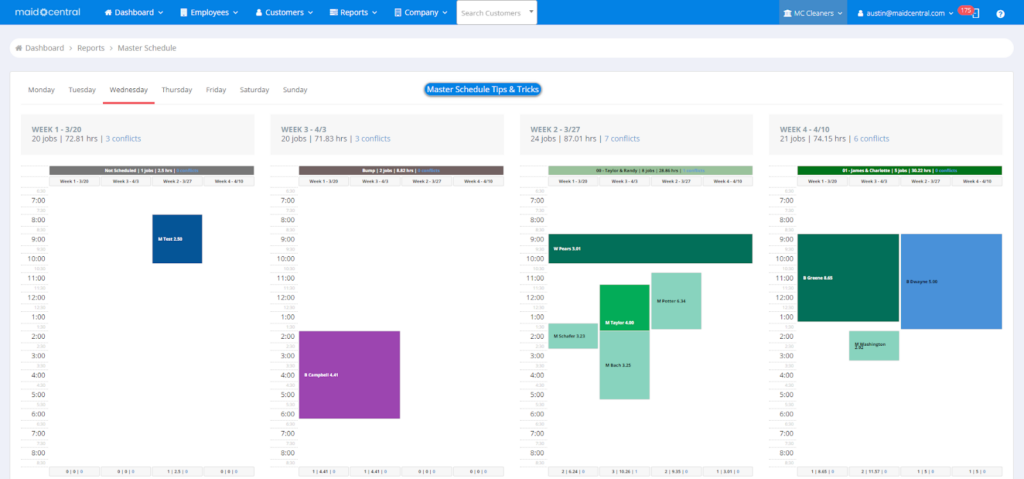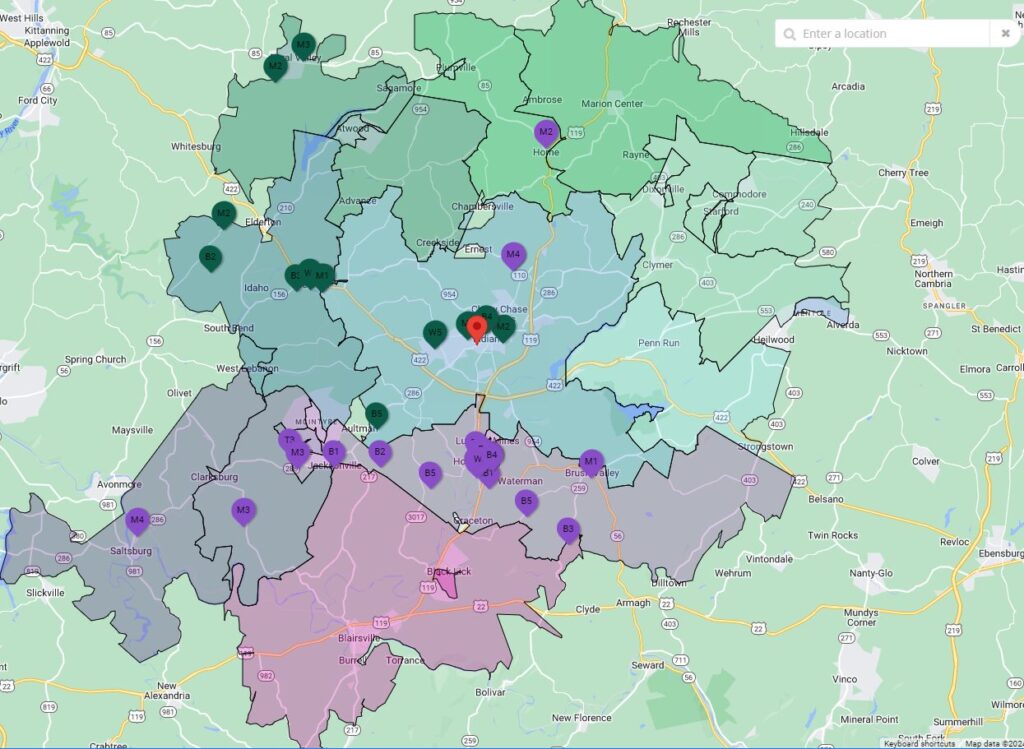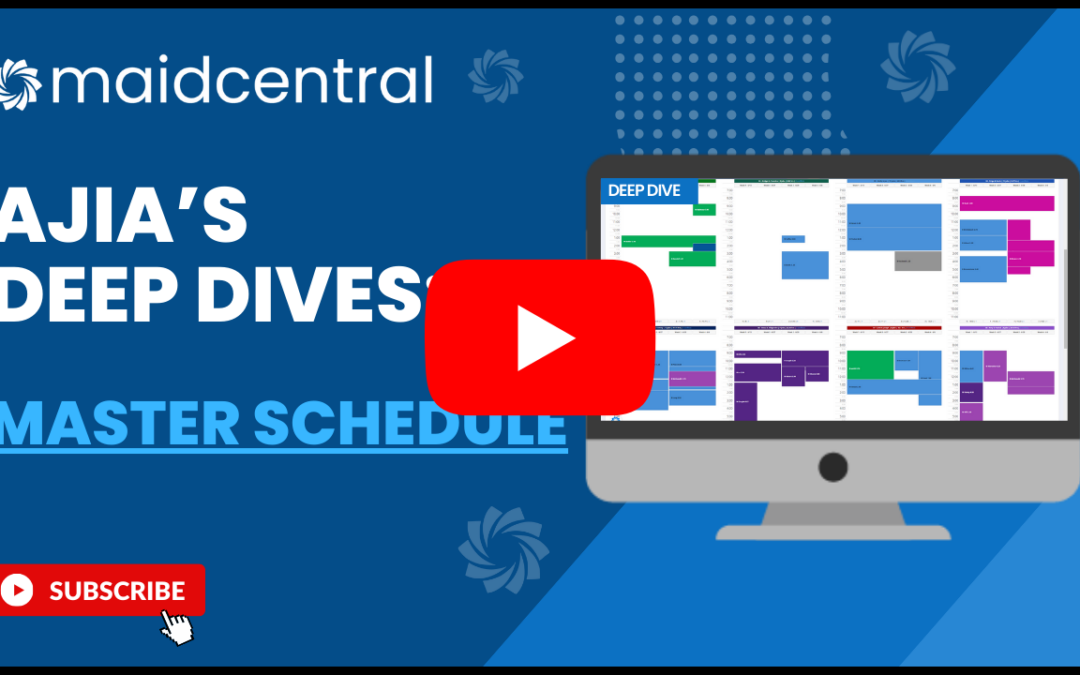As a cleaning business owner, one of the key challenges you face is managing and organizing your schedule effectively. With multiple clients, different cleaning tasks, and a team to coordinate, it can be overwhelming to ensure everything runs smoothly. That’s where a master schedule comes in. In this blog, we will explore the importance of a master schedule in residential cleaning businesses, its role in scheduling efficiency, and strategies to create, implement, and optimize your master schedule.
Understanding the Master Schedule
Before we delve into the details, let’s start by understanding what a master schedule is. Essentially, a master schedule is a comprehensive and detailed plan that outlines all the cleaning tasks, assigned personnel, timeframes, and locations for your cleaning company. It serves as a roadmap for your month, ensuring that all cleaning tasks are completed in a timely and effective manner.
Establishing Clear Objectives
The primary goal of utilizing the Master Schedule is to achieve operational consistency, enhance scheduling efficiency, and ensure high levels of client satisfaction. These objectives are important to remember when establishing rules for your business and how you manage your Master Schedule. You want to make sure that no matter who is in the position to manage this tool, they know what rules to follow and what purpose those rules achieve.
Why Cleaning Companies Need the Master Schedule
For cleaning companies, having a master schedule is crucial for several reasons. Let’s take a closer look at how a master schedule contributes to the success of your residential cleaning business:
Detailed Information
It provides detailed information on all the cleaning tasks that need to be completed. It ensures that nothing falls through the cracks and every client’s cleaning requirements are met. By having all the information in one place, you easily view your month, assign jobs, and communicate with your cleaning staff.
Balanced Workload Distribution
You can effectively distribute the workload among your cleaning staff. By assigning jobs based on their skills, availability, and location, you can ensure that each team member is utilized optimally. This not only improves operational efficiency but also promotes a balanced workload, preventing burnout and improving overall job satisfaction.
Operational Efficiency and Service Quality
Efficiency is the backbone of any successful cleaning business. A well-structured master schedule enables you to streamline your cleaning operations, minimize downtime, and optimize resource allocation. By assigning tasks strategically, you can ensure that cleaning staff can complete their work efficiently, providing high-quality service to your clients.
Optimizing Cleaning Staff Utilization
A well-designed master schedule allows you to make the most efficient use of your cleaning staff. By accounting for their availability, skills, and cleaning priorities, you can assign tasks in a way that minimizes conflicts and overlaps. This, in turn, leads to better utilization of your cleaning staff, reducing idle time and maximizing productivity.
Minimizing Task Conflicts and Overlaps
Job conflicts, such as two cleans with overlapping stop and start times, can disrupt your operations. With a master schedule, you can identify and resolve potential conflicts ahead of time, ensuring smoother job execution. This leads to a reduction in time spent fixing schedules in the back office, and a more efficient workflow.
Resource Allocation based on Cleaning Priorities
Different cleaning tasks may have varying levels of priority, depending on client requirements or cleaning complexity. With a master schedule, you can allocate your resources effectively, ensuring that the most critical tasks receive the necessary attention and resources they require. This helps to maintain a consistent level of service quality and customer satisfaction.
By leveraging the power of a master schedule, you can enhance scheduling efficiency, optimize resource allocation, and ultimately, improve the overall productivity and success of your cleaning business.
MaidCentral’s Master Schedule
The Master Schedule within MaidCentral uniquely displays a 4 week rotation of each day of the week. This scheduling tool shows your entire recurring schedule in 5 clicks by laying out each team for each day of the week with every recurring customer in their permanent spot. The great thing about this view is that even if a customer skips or reschedules a single clean, their spot doesn’t change unless the entire schedule changes so no more accidental double booking!
The master schedule is the crux of any MaidCentral company’s permanent schedule. It is important to remember that the permanent and active schedule are two separate schedules. Your active schedule organizes all jobs on a day, including recurring jobs that haven’t skipped or rescheduled and one time cleans, and matches those with the available resources. The permanent schedule is where your financial security lies so it is imperative that we prioritize our recurring services when we are scheduling and this is the only tool available to cleaning businesses that does just that.

How to Create an Effective Master Schedule
Now that we understand the ‘why’ behind the master schedule, let’s explore how you can create an effective one for your cleaning business. By following these strategies, you can develop a comprehensive master schedule that ensures efficient cleaning operations and maximizes customer satisfaction.
Alternatively, if you believe that your business is in the position to scale by utilizing more advanced reporting, functionality, and tools like this, then don’t hesitate to reach out to us! We’d love to learn more about your business and how MaidCentral might be able to help you grow.
Steps to Create a Master Schedule
To create an effective master schedule, first start by analyzing cleaning requirements and identifying recurring jobs. Next, lay out all the recurring jobs for different geographic areas and days of the week. Then, assign jobs to specific time slots and allocate resources accordingly. Regularly review the schedule to address any inefficiencies or necessary adjustments, and seek feedback from cleaning staff for continuous improvement. By following these steps diligently, you can ensure a well-organized and efficient master schedule for your cleaning business.
Key Components of a Master Schedule
First we must consider various key components. Here are the essential elements to include:
- Cleanings: Compile a detailed list of all the cleans for the month. Break down the tasks into categories, such as regular cleaning, deep cleaning, or specialized services.
- Timeframes: Determine the estimated time required to complete each task, taking into account cleaning complexity and the size of the cleaning area. Many cleaning companies employ a method of assigning hours to cleans, like Job Ticket Hours, or Allowed Hours.
- Assigned Personnel: Assign the cleaning tasks to specific cleaning staff, considering their skills, availability, and areas of expertise.
- Geographic Area: Consider where each team lives or works. It can be far more efficient to schedule a cleaner to complete jobs in the area that they live in.

- Cleaning Areas: Clearly identify and define the different cleaning areas for each client, such as bedrooms, bathrooms, kitchens, and common areas. Learn more about Rotational Services here.
- Buffer Times: Include buffer times in your schedule to account for unexpected delays, emergencies, drive time, or additional cleaning tasks that may arise.
By incorporating these key components, you can create a master schedule that provides a comprehensive overview of your cleaning operations and ensures efficient task execution.
Organizing the Master Schedule in MaidCentral
Organizing cleaning teams based on geographic zones and technicians’ experience levels facilitates efficient scheduling. This method helps minimize travel time between jobs, ensures that skilled technicians are matched with the appropriate customers, and ultimately enhances productivity and customer satisfaction.
This method is best utilized with solo technicians that drive directly from and to their home most days of the week. If you have the ability to color coordinate your Teams and your geographic areas, that can also be extremely helpful to have the team colors match the zone they live in or closest to to make the best informed drive time decisions available.
Once each team is colored to match the technician’s home location, group the teams together by color. And finally, arrange the technicians within each grouping based on who has been with the company the longest at the top of each group.

Arranging your teams this way allows everyone in your business to make informed decisions for the permanent schedule, they will know generally how far a technician is from a home based on the zone, and how experienced the technician is based on where they are within their zone group. This way, if a customer needs a new technician with specific skills or scheduling needs, it is that much easier to find them an appropriate spot on the permanent schedule.
For more information on how to use the Master Schedule, please refer to this dedicated support article.
Implementing a Master Schedule in Your Cleaning Business
To successfully integrate a master schedule into your cleaning business, it’s essential to streamline daily operations smoothly. Ensuring that the schedule aligns with the specific needs of your business and client base is crucial. Implementing strategies for effective time management and task allocation can significantly boost operational efficiency and customer satisfaction. Regularly reviewing and optimizing the schedule based on performance data can further enhance scheduling accuracy and resource utilization. By integrating a detailed system, your cleaning business can achieve optimal productivity levels and maintain high service standards.
Strategies for Smooth Implementation
To ensure a seamless implementation process, effective communication of schedule changes to the cleaning team is crucial. Providing training on scheduling tools can enhance overall efficiency. Open communication channels help address scheduling challenges proactively. Recognizing and rewarding staff for schedule adherence boosts motivation levels. Implementing feedback mechanisms gathers valuable insights for schedule optimization. By following these strategies, the implementation of the master schedule in your cleaning business can be smooth and successful.
Tips to Optimize Your Master Schedule
Regularly updating and revising your schedule is essential to ensure it remains aligned with business needs. Automating schedule syncs can save time and reduce errors by ensuring all team members are on the same page with real-time updates. By incorporating these strategies, you can streamline operations and improve overall efficiency.
Regular Updates and Revisions
To ensure operational efficiency, it is crucial to maintain accuracy by updating schedules regularly. Aligning schedules with business goals through revisions is essential for success. Adapting to evolving priorities becomes seamless with regular updates. Optimizing resource allocation is facilitated by revising schedules. Updated schedules serve as a clear roadmap for task execution, aiding in achieving business objectives effectively and efficiently.
Automating Schedule Syncs
Enhancing schedule management efficiency, automating syncs reduces manual errors and streamlines operations. Real-time updates across platforms are enabled by automated syncs, saving valuable time for cleaning business owners. Implementing detailed information on sync automation improves scheduling accuracy and overall operational effectiveness. MaidCentral handles all scheduling syncs seamlessly in the background, so no more dispatching jobs. It’s all live!
Addressing Flex Clients
When catering to clients with flexible schedules, it’s crucial to establish clear communication channels and expectations. Offering customized service packages tailored to their specific needs can help in accommodating their varying schedules effectively. Implementing a user-friendly booking system that allows clients to easily adjust appointments can streamline the process and enhance customer satisfaction. Providing detailed information about the available services and scheduling options can empower flex clients to make informed decisions, ultimately leading to a positive experience and long-term loyalty.
Strategy 1
Incorporating a client-focused approach, scheduling strategies adapt to diverse client needs efficiently. Embracing flexibility ensures tailored schedules for heightened client satisfaction. Addressing dynamic scheduling requirements enhances service delivery and customer loyalty. Customized schedules cater to individual client specifications, fostering strong client-business relationships.
Strategy 2
Designing innovative scheduling strategies that cater to individual client preferences is paramount in client-centered scheduling approaches. By adeptly managing diverse client scheduling needs, businesses can tailor their methods to ensure optimal satisfaction. Adapting scheduling techniques to suit each client’s unique requirements enhances the overall customer experience and fosters loyalty. Personalizing scheduling strategies based on detailed information gathered from clients can significantly boost client satisfaction levels and set businesses apart in the competitive cleaning industry.
The Impact of a Master Schedule on Business Growth
Enhancing business growth, a master schedule streamlines operations, boosting productivity and efficiency. By providing a structured framework, it optimizes resource allocation and time management. This detailed information ensures that tasks are prioritized, deadlines are met, and resources are utilized effectively, leading to improved overall performance and profitability. Embracing a master schedule empowers businesses with the ability to adapt swiftly to changing demands, fostering a dynamic and responsive operational environment.
Boosting Productivity with a Master Schedule
By optimizing task sequences, structured schedules reduce downtime and enhance efficiency. Effective time allocation in master schedules leads to increased productivity. Scheduling also promotes team collaboration, elevating output quality. Streamlining workflows through master schedules results in heightened productivity levels.
How can a Master Schedule Transform Your Business Operations?
Transform your business operations with a strategic scheduling approach. Enhance transparency and drive process efficiency through master schedules. Achieve operational excellence by refining your scheduling methods. Optimize operations by leveraging master schedules effectively.
Conclusion
Master schedules are the backbone of efficient cleaning businesses, ensuring optimal scheduling and boosting productivity. By implementing and optimizing a master schedule, you can streamline operations, enhance client satisfaction, and drive business growth. Regular updates, automation, clear objectives, and strategies for flexible clients are key to successful implementation. Embrace the power of a well-crafted master schedule to transform your cleaning business operations and achieve your growth objectives. For further guidance on mastering your schedule, book a free consultation with our experts today.


